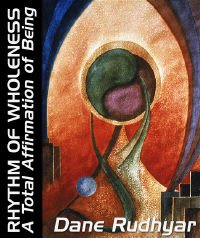 |
| Home | Bio | Art | Music | Literature | Civilization & Culture | Philosophy of Wholeness | Theosophy & Spirituality | Astrology |

RHYTHM OF WHOLENESS A Total Affirmation of Being by Dane Rudhyar, 1983 CONTENTS PROLOGUE PART ONE The Philosophy of Operative Wholeness 1. Prelude to a New Interpretation of Reality 2. The Search for Spiritual Security: The One, the Whole, and Wholeness Page 1 Page 2 Page 3 Page 4 Page 5 Page 6 3. The Movement of Wholeness PART TWO The Cycle of Being 4. The Structure of the Cycle of Being 5. The Four Crucial Phases of the Cycle of Being 6. The Inevitability of Success and Failure 7. Spirit and Mind PART THREE The Cycle of Man 8. Constitution of Man - The Physical and Psychic Bodies 9. Constitution of Man - The Spiritual Entity and the Higher Mind 10. The Structure and Transformation of the Total Person 11. The Cyclic Process of Spiritual Embodiment PART FOUR In The Spirit of Wholeness 12. The Principle of Holarchy and the Interplay of Horizontal and Vertical Relationships 13. Transpersonal Activity versus Mediumship 14. Rites of Passage EPILOGUE |

CHAPTER TWO
The Search for Spiritual Security: The One, the Whole, and Wholeness - 1 The earliest Hindu philosophies probably were formulated as answers to basic questions posed by universal human experiences, the most fundamental of these being the experience of unceasing change. Various, indeed contrasting, answers arose, and in time they were codified into the six great Schools (or darshanas) of Indian philosophy. Yet a central psychological motive underlies the different worldviews presented by these schools: the search for what, psychologically speaking, it seems best to call inner security. Security here refers to the implicit belief in "something" that, because it underlies all changes, is changeless. To use a symbolic analogy, this something was felt and thought to be the absolutely solid and permanent "rock" on which the house of consciousness — and indeed the feeling of existence itself — had to rest. Sri Aurobindo — the greatest mind and seer of modern India — stated the issue simply in his clear and impressive prologue to his translation of the main Upanishads: To the phenomenal world around us stability and singleness seem at first to be utterly alien; nothing but passes and changes, nothing but has its counterparts, contrasts, harmonized and dissident parts; and all are perpetually shifting and rearranging their relative positions and affections. Yet if one thing is certain, it is that the sum of all this change and motion is absolutely stable, fixed and unvarying, that all this heterogenous multitude of animate and inanimate things are fundamentally homogeneous and one. Otherwise nothing could endure, nor could there be any certainty in existence. And this unity, stability, unvarying fixity which reason demands, and ordinary experience points to is being ascertained slowly but surely by the investigations of Science. We can no longer escape from the growing conviction that however the parts may change and shift and appear to perish, yet the sum and the whole remains unchanged, undiminished and imperishable; however multitudinous mutable and mutually irreconcilable forms and compounds may be, yet the grand substratum is one, simple and enduring.(1)These statements clearly establish the central position of the spiritual aspect of Indian philosophy, but they are remarkable for what they take for granted. The sentence beginning "Yet if one thing is certain" constitutes an assumption which cannot be proven or justified. Especially the statements that "the sum of all this change and motion is absolutely stable, fixed and unvarying," and that "reason demands" this basic unity, stability and unvarying fixity, are anything but evident. To say that without such a unity, stability and unvarying fixity "there could be [no] certainty in existence" begs the question: why should there be "certainty in existence"? The answer is obvious: man needs certainty in order to feel secure. Sri Aurobindo, however, apparently did not envision such a psychological answer, nor did his predecessors in the Vedanta. Indian metaphysics and philosophy relied instead on the testimonies and discoveries of a long series of great yogis who claimed to have found a method for experiencing this absolute unity, stability, and changelessness as the ground of all existence, Brahman, "the One and Absolute... which alone is." Sri Aurobindo goes on to state that "if there is no reality but Brahman, the phenomenal Universe, which is obviously a manifestation of something permanent and eternal, must be a manifestation of Brahman and of nothing else."(2) Brahman manifests in different ways at each of three fundamental levels of being (or Universes). For man, Brahman manifests as the Supreme Self who is identical with the transcendent Self in all human beings, atman. The Upanishads tell us that Brahman is not a blind universal Force working by its very nature mechanically, nor even an unconscious Cause of Force; He is conscious or rather is Himself Consciousness, cit, as well as sat [Being)...the wider knowledge of the Universe attainable to Yoga actually does reveal such a Universal Intelligence everywhere at work. Brahman, then, is Consciousness, and this once conceded, it follows that He must be in His transcendent reality Absolute Consciousness. His Consciousness is from itself and of itself like His existence, because there is nothing separate and other than Him; not only so but it does not consist in the knowledge of one part of Himself by another, or of His parts by His whole, since His transcendental existence is one and simple, without parts. His consciousness therefore does not proceed by the same laws as our consciousness, does not proceed by differentiating subject from object, knower from known, but simply is, by its own right of pure and unqualified existence, eternally and illimitably, in a way impure and qualified existences cannot conceive.(3)Such metaphysical conceptions, which Aurobindo develops eloquently and logically, are based, I repeat, on premises believed to be incontrovertible: "reason demands" them; without them there would be no "certainty in existence"; and experiences of the great Yogis (and of Aurobindo himself) prove them absolutely true. But my question is: Can one speak of truth if one does not ask, for whom? The Hindu philosopher realizes that there are basic levels of existence and consciousness, that what seems separate at one level may be seen united at another. The Vedanta states that "identity is a fact in the reality of things, the world of phenomena."(4) Human consciousness, however, is said to be able to evolve from the realm of appearances to that of reality. The problem is: Why should one give to this kind of reality an absolutely positive meaning? Must we give to any experience a character of absolute validity or accuracy? Moreover, what actually is meant by Consciousness and especially Absolute Consciousness? I do not question in any way the validity of the great yogis' experiences; any intense and illuminating experience is "true" for the experiencer. But as the experiencer attempts to formulate it, even to his own mind, the experience must be interpreted. The most sublime philosophical statement, even before it is organized into a system of concepts, has to use images, symbols, and words provided by a particular culture. Even if the experiencer can physically or spiritually induce a similar experience in the consciousness of another being, should one speak of an identical experience? For in each transmission something of the original experience seems to undergo a subtle (or crude) transformation. Interpretation seems to be unavoidable in interhuman relationships. Sri Aurobindo's words tell the story well. Indeed, human beings may need some kind of "certainty," and "reason" may demand the belief in some postulates; but, granted this need is universal, it can be answered in different ways in different epochs, in different regions of the planet, and thus by different cultures. Any culture's claim to absolute superiority because it enables its participants to reach what it calls absolute Truth and Reality is a form of collective pride. Whether it be Indian, Tibetan, Chinese, or Euro-American, it is still the same cultural pride. It is also an answer to the same basic human insecurity, the same need for something solid and absolutely reliable because unaffected by change and existential conditions. 1. Sri Aurobindo, The Upanishads (Pondicherry: 1972), p. 1. Sri Aurobindo began his long life as one of the earliest and most uncompromising advocates of India's independence from the British empire. Jailed for his activities, then freed but still menaced after a famous trial, he left for Pondicherry (then a French colony), where he died in 1950. Profound spiritual experiences while in prison led him to forgo political for spiritual activity. After writing a great many remarkable books, he gathered around him a number of his disciples, and with the help of a French woman, Mother Mira, an ashram was organized. After 1927, Sri Aurobindo became a recluse almost completely, concentrating on "inner work." He also wrote an extraordinary epic poem, Savitri, and engaged in much correspondence with students all over the world. This passage is reprinted with the kind permission of Sri Aurobindo Trust. Return 2. op. cit., p. 10. Return 3. op. cit., pp. 18f. Return 4. op. cit., p. 11. Return By permission of Leyla Rudhyar Hill Copyright © 1983 by Dane Rudhyar All Rights Reserved.  Web design and all data, text and graphics appearing on this site are protected by US and International Copyright and are not to be reproduced, distributed, circulated, offered for sale, or given away, in any form, by any means, electronic or conventional. See Notices for full copyright statement and conditions of use. Web design copyright © 2000-2004 by Michael R. Meyer. All Rights Reserved. |
 |